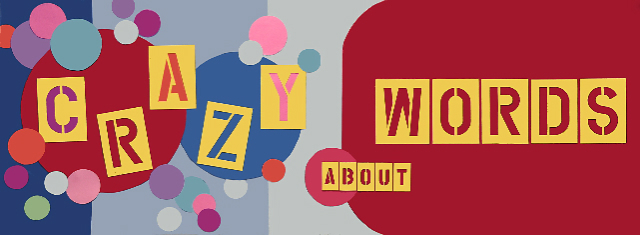Confetti–this month’s assortment of words
Joe Mc Kay’s “Crazy About Words”
…toasting our language since 2003!
My life is strewn with bits of paper, words scribbled on them, and shards of newspapers and magazines with words or phrases circled. I find them in my pockets, all over the house, serving as bookmarks, on dry cleaning tickets I now can’t surrender, on cash register receipts, and restaurant napkins. I seldom remember to carry one of the little pads purchased to keep words I hear or read organized in one place.
I’m sitting with a small pile of these jots I’ve gathered to share. They look like large confetti. So let’s do a gala!
On the day of “the wedding,” “regalia” was used all day long to describe the royals’ dress (except for Princess Beatrice’s hat! That was called many other things). The word originally applied to the symbols of royalty, e.g., the crown & scepter; gradually, to the symbols of rank, like military officers’ brass; and, eventually, to any finery in dress. It’s a Latin plural (as is confetti) used as a singular noun in English to describe, sometimes facetiously, any dressed-up look. Used in this sense, the opposite/antonym of “regalia” that I like best is “rags.”
I came across “spavined” in Morris West’s 1963 novel, The Shoes of the Fisherman: “He had flung his cap at the whirling windmills, but when the time came to assault them…how would he be then? A knight in shining armor…Or an aging Quixote on a spavined nag, an object of laughter for men and angels?”
For hundreds of years, it’s been used only to refer to a bony-hipped horse. But why not broaden its definition a bit and extend its use? Aren’t there millions of humans in the world who would rather think of themselves as “spavined” than “arthritic?” It sounds more elegant, begs elaboration, and might just save the word from becoming archaic.
David Brooks is helping coin a couple of neologisms. In his new book, The Social Animal, he writes of “sanctimommies”/ mothers who critique their peers’ parenting skills and “extracurricular sluts”/ their kids who participate in too many organized after-school activities. No one has more fun with our language than he.
The hero of a 2005 novel, Indecision, by Benjamin Kunkel is described as “the 21st-century literary descendant of Holden Caulfield” except that he suffers from “abulia,” a disease characterized by a lack of will or initiative. “Dwight knows that his indecisiveness makes him a sociological cliché.”
“Fracking” is the buzzword in the world of energy technology. It describes a new, economical method of hydraulic fracturing of underground shale rock allowing vast supplies of otherwise trapped natural gas to flow. Promoters say it’s a safe method to tap into 100-plus years’ supply in the US & Canada; detractors say it may pose a threat to drinking water. It’s controversial, and “fracking” will soon be on everyone’s lips….a new “f-word” at last!
One syndicated version of cryptograms is called “Cryptoquote.” I love to work these puzzles and watch the wise words of well known people emerge from the eyesore of encryption. A recent cryptoquote yielded this from Dr. Seuss: “… There is no one alive who is youer than you.” It’s a psychological principle, a spiritual concept, and a great word all rolled into one! Seuss could have properly used “more you,” but, oh, how I appreciate his lexi-play that, at last, gives us a homonym of “ewer.”
I hope you will accumulate some confetti of your own and enjoy a party with fellow word lovers.
Comments and questions welcome by e-mail to crazyaboutwords@gmail.com
Please feel free to share this column with friends. Any who would like to receive it should send their e-mail address to me at crazyaboutwords@gmail.com






